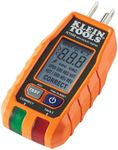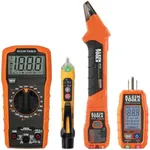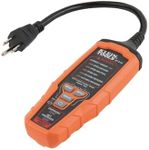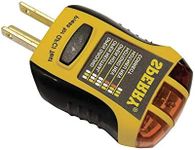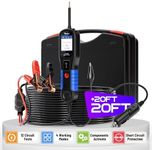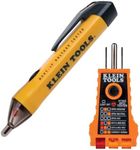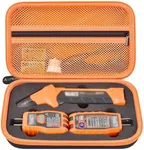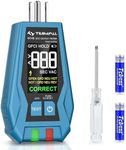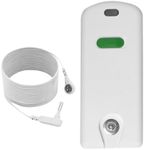Buying Guide for the Best Electric Outlet Tester
Choosing the right electric outlet tester is crucial for ensuring the safety and functionality of your electrical outlets. An electric outlet tester helps you identify wiring issues, such as open grounds, open neutrals, and reversed wires, which can prevent electrical hazards. When selecting an electric outlet tester, consider the following key specifications to ensure you get the best fit for your needs.Type of TesterElectric outlet testers come in different types, including basic plug-in testers, GFCI testers, and advanced digital testers. Basic plug-in testers are simple and easy to use, providing quick results for common wiring issues. GFCI testers can test ground fault circuit interrupters, which are essential for outlets near water sources. Advanced digital testers offer more detailed diagnostics and can display voltage levels. Choose a tester based on the complexity of the tasks you need to perform. For general home use, a basic or GFCI tester is usually sufficient, while professionals might prefer advanced digital testers.
Display TypeThe display type of an electric outlet tester can range from simple LED indicators to digital screens. LED indicators are straightforward, using different light patterns to indicate various wiring issues. Digital screens provide more detailed information, such as exact voltage readings and error codes. If you prefer quick and easy-to-read results, an LED indicator tester is a good choice. However, if you need more detailed diagnostics, a tester with a digital screen will be more beneficial.
Voltage RangeThe voltage range of an electric outlet tester indicates the range of voltages it can safely test. Most household outlets operate at 120V, so a tester that covers this range is typically sufficient for home use. However, if you need to test outlets with different voltage levels, such as 240V outlets for large appliances, ensure the tester can handle those voltages. Choose a tester with a voltage range that matches the outlets you plan to test to ensure accurate and safe measurements.
GFCI Testing CapabilityGFCI (Ground Fault Circuit Interrupter) testing capability is important if you need to test outlets in areas where water is present, such as kitchens and bathrooms. GFCI testers can simulate a ground fault to ensure the outlet's safety mechanism is functioning correctly. If you have GFCI outlets in your home, it's essential to choose a tester with this capability to ensure they are working properly and providing the necessary protection against electrical shocks.
Durability and Build QualityDurability and build quality are important factors to consider, especially if you plan to use the tester frequently or in various environments. A well-built tester will withstand drops, impacts, and regular wear and tear. Look for testers made from high-quality materials with sturdy construction. If you are a professional or need a tester for heavy-duty use, prioritize durability to ensure the tester lasts longer and provides reliable performance.
Ease of UseEase of use is a key consideration, especially for those who are not familiar with electrical testing. A user-friendly tester will have clear instructions, intuitive design, and easy-to-read indicators or displays. Some testers also come with additional features like audible alerts to make the testing process even simpler. Choose a tester that you feel comfortable using and that provides clear and straightforward results to ensure you can effectively identify and address any wiring issues.
